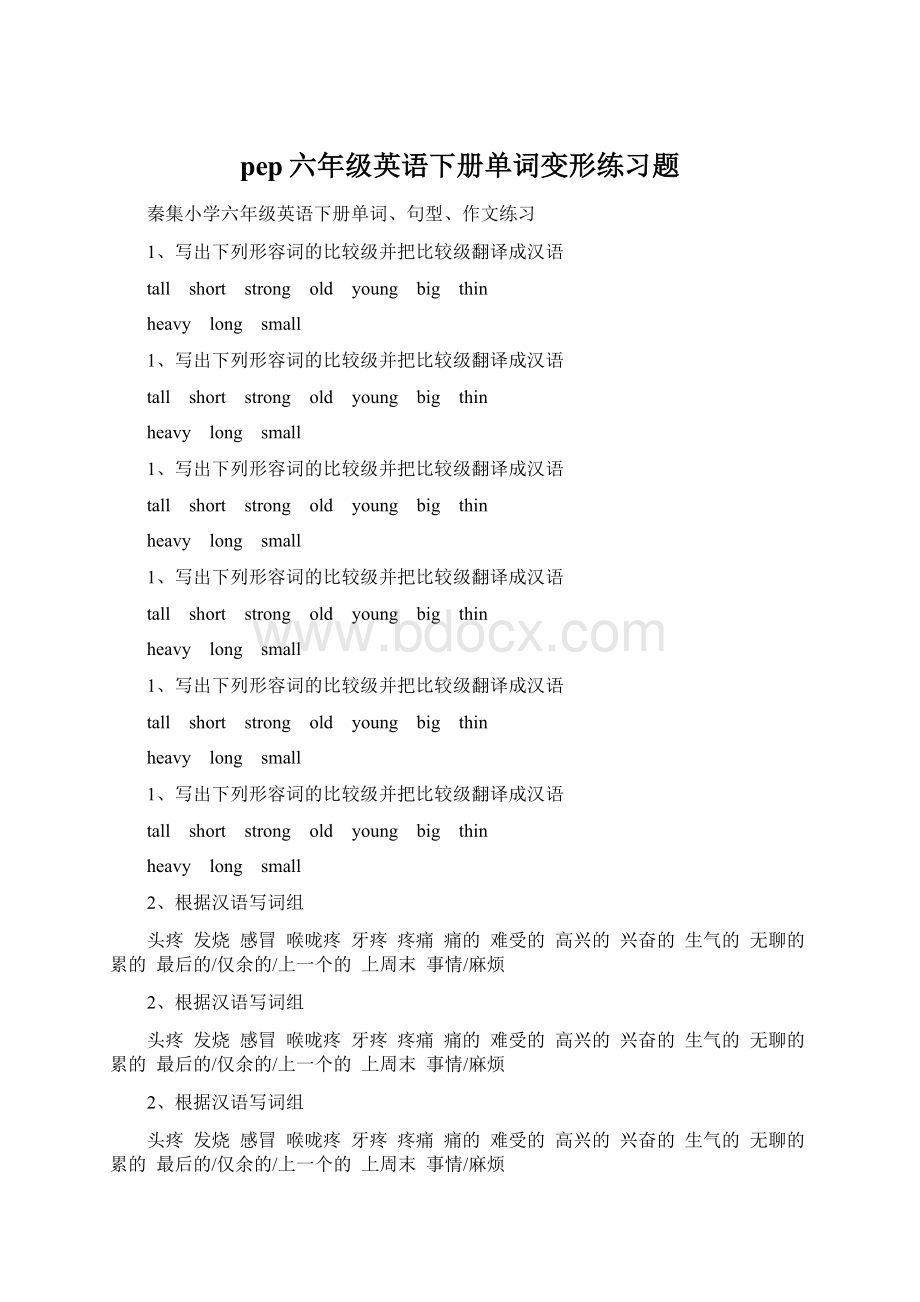pep六年级英语下册单词变形练习题.docx
《pep六年级英语下册单词变形练习题.docx》由会员分享,可在线阅读,更多相关《pep六年级英语下册单词变形练习题.docx(17页珍藏版)》请在冰豆网上搜索。

pep六年级英语下册单词变形练习题
秦集小学六年级英语下册单词、句型、作文练习
1、写出下列形容词的比较级并把比较级翻译成汉语
tallshortstrongoldyoungbigthin
heavylongsmall
1、写出下列形容词的比较级并把比较级翻译成汉语
tallshortstrongoldyoungbigthin
heavylongsmall
1、写出下列形容词的比较级并把比较级翻译成汉语
tallshortstrongoldyoungbigthin
heavylongsmall
1、写出下列形容词的比较级并把比较级翻译成汉语
tallshortstrongoldyoungbigthin
heavylongsmall
1、写出下列形容词的比较级并把比较级翻译成汉语
tallshortstrongoldyoungbigthin
heavylongsmall
1、写出下列形容词的比较级并把比较级翻译成汉语
tallshortstrongoldyoungbigthin
heavylongsmall
2、根据汉语写词组
头疼发烧感冒喉咙疼牙疼疼痛痛的难受的高兴的兴奋的生气的无聊的累的最后的/仅余的/上一个的上周末事情/麻烦
2、根据汉语写词组
头疼发烧感冒喉咙疼牙疼疼痛痛的难受的高兴的兴奋的生气的无聊的累的最后的/仅余的/上一个的上周末事情/麻烦
2、根据汉语写词组
头疼发烧感冒喉咙疼牙疼疼痛痛的难受的高兴的兴奋的生气的无聊的累的最后的/仅余的/上一个的上周末事情/麻烦
2、根据汉语写词组
头疼发烧感冒喉咙疼牙疼疼痛痛的难受的高兴的兴奋的生气的无聊的累的最后的/仅余的/上一个的上周末事情/麻烦
2、根据汉语写词组
头疼发烧感冒喉咙疼牙疼疼痛痛的难受的高兴的兴奋的生气的无聊的累的最后的/仅余的/上一个的上周末事情/麻烦
3、写出下列动词的过去式并翻译成汉语
watchTVwashtheclothescleantheroomplayfootballvisitgrandparentsdogo
gotoaparkgoswimmingreadbooksgofishinghavegohiking
3、写出下列动词的过去式并翻译成汉语
watchTVwashtheclothescleantheroomplayfootballvisitgrandparentsdogo
gotoaparkgoswimmingreadbooksgofishinghavegohiking
3、写出下列动词的过去式并翻译成汉语
watchTVwashtheclothescleantheroomplayfootballvisitgrandparentsdogo
gotoaparkgoswimmingreadbooksgofishinghavegohiking
3、写出下列动词的过去式并翻译成汉语
watchTVwashtheclothescleantheroomplayfootballvisitgrandparentsdogo
gotoaparkgoswimmingreadbooksgofishinghavegohiking
写出下列动词的过去式并翻译成汉语
learnChinesegettosinganddanceeatgoodfoodclimbamountaintakepicturesbuypresentsrowaboatseeelephantsgoskiing
goice-skatingdo(过去式的否定式)=
写出下列动词的过去式并翻译成汉语
learnChinesegettosinganddanceeatgoodfoodclimbamountaintakepicturesbuypresentsrowaboatseeelephantsgoskiing
goice-skatingdo(过去式的否定式)=
写出下列动词的过去式并翻译成汉语
learnChinesegettosinganddanceeatgoodfoodclimbamountaintakepicturesbuypresentsrowaboatseeelephantsgoskiing
goice-skatingdo(过去式的否定式)=
写出下列动词的过去式并翻译成汉语
learnChinesegettosinganddanceeatgoodfoodclimbamountaintakepicturesbuypresentsrowaboatseeelephantsgoskiing
goice-skatingdo(过去式的否定式)=
写出下列动词的过去式并翻译成汉语
watchTVwashtheclothescleantheroomplayfootballvisitgrandparentsdogo
gotoaparkgoswimmingreadbooksgofishinghavegohiking
learnChinesegettosinganddanceeatgoodfoodclimbamountaintakepicturesbuypresentsrowaboatseeelephantsgoskiing
goice-skatingdo(过去式的否定式)=
4、按顺序默写26个字母大、小写。
写出下列动词的过去式并翻译成汉语
watchTVwashtheclothescleantheroomplayfootballvisitgrandparentsdogo
gotoaparkgoswimmingreadbooksgofishinghavegohiking
learnChinesegettosinganddanceeatgoodfoodclimbamountaintakepicturesbuypresentsrowaboatseeelephantsgoskiing
goice-skatingdo(过去式的否定式)=
4、按顺序默写26个字母大、小写。
5、作文:
上周末LastWeekend
Iwasbusy(忙碌)lastweekend.OnSaturdaymorning,Iwashedmyclothes.Intheafternoon,Iwenthiking.Intheevening,IwatchedTV.OnSundaymorning,Ivisitedmygrandparents.Intheafternoon,Ididmyhomework.Iwastired,butveryhappy.
LastWeekend
LastWeekend
LastWeekend
LastWeekend
(人教PEP)五年级英语下册单词专项练习
第一单元domorningexercises(晨练)eatbreakfast(吃早饭)haveEnglishclass(上英语课)playsports(进行体育运动)eatdinner(吃晚饭)when(什么时候)evening(夜晚;晚上)getup(起床)at(在…点钟)usually(通常;一般)noon(中午)climbmountains(爬山)goshopping(购物;买东西)playthepiano(弹钢琴)visitgrandparents(看望祖父母)gohiking(去远足)weekend(周末)often(经常)sometimes(有时候)
一、四会单词和短语:
1.晨练___________________________2.吃早饭____________
3.上英语课_________________4.进行体育活动___________
5.吃晚饭__________________6.什么时候______
7.夜晚,晚上_______8.起床_____________
9.在…点钟_____10.通常,一般________
11.中午______12.爬山_______
13.购物,买东西__________14.弹钢琴______________________
15.看望外祖父母___________16.去远足_____________
17.周末______18.经常_______ 19.有时候________
二、必须掌握的四会句子:
1)你什么时候吃晚餐?
Whendoyoueatdinner?
________________________?
我在晚上7:
00吃晚餐。
Ieatdinnerat7:
00intheevening.______________________________.
2)你什么时候起床?
Whendoyougetup?
_______________________________?
我通常在中午12:
00起床。
Iusuallygetupat12:
00atnoon._____________________________________..
你周末做什么?
Whatdoyoudoontheweekend?
_____________________________________?
通常我看电视和去购物。
UsuallyIwatchTVandgoshopping.___________________________________.
有时我去看看爷爷奶奶。
SometimesIvisitmygrandparents._____________________________________.
4)我经常踢足球。
有时我去远足。
Ioftenplayfootball.SometimesIgohiking.______________________________________.
第二单元:
spring(春天)summer(夏天)fall(秋天)winter(冬天)season(季节)which(哪一个)best(最;极)swim(游泳)flykites(放风筝)skate(滑冰;滑冰鞋)makeasnowman(堆雪人)planttrees(种树)why(为什么)because(因为)sleep(睡觉)
一、词汇短语:
1.经常________ 2.有时候________3.春天________ 4.夏天_________
5.秋天________ 6.冬天_________7.季节________ 8.哪一个__________
9.最,极______ 10.游泳_______11.放风筝_____12.滑冰,滑冰靯_______
13.堆雪人_________14.种树_________15.为什么______16.因为_______ 17、睡觉_________
二、必须掌握的四会句:
1.你最喜欢哪个季节?
Whichseasondoyoulikebest?
_____________________________________________?
2.我最喜欢冬天。
Ilikewinterbest.
_____________________________________.
3.夏天是好的,可秋天是我最喜欢的季节。
Summerisgood,butfallismyfavouriteseason.
_________________,______________________.
4.你为什么喜欢夏天?
Whydoyoulikesummer?
_____________________________________________?
5.因为我可以在湖里游泳。
BecauseIcanswiminthelake.
__________________________________________.
6.你为什么喜欢冬天?
Whydoyoulikewinter?
_______________________________________________?
7.因为我可以睡懒觉。
BecauseIcansleepalongtime.
______________________________________________.
第三单元:
Jan./January(一月)Feb./February(二月)Mar./March(三月)Apr./April(四月)May(五月)June(六月)July(七月)Aug./August(八月)Sept./September(九月)Oct./October(十月)Nov./November(十一月)Dec./December(十二月)birthday(生日)uncle(叔叔;舅舅)her(她的)date(日期)
一、12个月份单词和缩略式书写:
1.一月_____________2.二月____________3.三月__________
4.四月_____5.五月______ 6.六月_______
7.七月________8.八月__________ 9.九月____________
10.十月__________11.十一月________12.十二月__________
二、必须掌握的句子:
1.你的生日是什么时候?
Whenisyourbirthday?
____________________?
在五月。
It’sinMay.
___________________________.
2.我的生日在六月。
MybirthdayisinJune.
________________________________.
比尔叔叔的生日也在六月。
UncleBill’sbirthdayisinJune,too.
____________________________________________________________.
3.她的生日在六月吗?
IsherbirthdayinJune?
________________?
是的。
Yes.__________.
4.今天是几月几日?
What’sthedate?
______________________________?
六月九日。
June9th.___________________.
5.今天是几月几日?
What’sthedatetoday?
___________________________?
四月十日。
It’sApril10th._____________________.
第四单元drawpictures(画画)cookdinner(做饭)readabook(看书)answerthephone(接电话)listentomusic(听音乐)cleantheroom(打扫房间)writealetter(写信)writeane-mail(写电子邮件)mom(妈妈)grandpa(爷爷;外公)study(书房)
1、画画______________2、做饭_________________3、看书_______________4、接电话_________________5、听音乐_________________6、打扫房间_________________7、写信_________________8、写电子邮件_________________9、妈妈______10、爷爷;外公______11书房______
1、这是张鹏.ThisisZhangPeng.________________________________.
2、你正在做什么?
Whatareyoudoing?
_______________________________?
我正在洗碗碟。
I’mdoingthedishes.____________________________.
我正在看书。
I’mreadingabook._________________________________.
3、爷爷正在写信。
Grandpaiswritingaletter.____________________________.
弟弟、哥哥正在做作业。
Brotherisdoinghomework._____________________________________________.________.
妈妈正在厨房里做饭。
Momiscookingdinnerinthekitchen.______________________________________________._______.
4、他正在书房里写电子邮件。
He’swritingane-mailinthestudy.______________________________________._______________.
4--6课相关语法:
1、现在进行时时态表示正在发生的动作。
如:
(1)我正在看电视。
Iamwatching.
(2)她正在做作业。
Sheisdoinghomework.
A、现在进行时句子的构成:
主语+be动词(am/is/are)+动词的现在分词。
B、动词的现在分词,即动词的—ing形式。
构造如下:
①绝大多数的动词变现在分词,都是直接在动词后面直接加-ing,如:
read—reading(读/看)cook—cooking(做饭)do—doing(做);
②以e结尾的动词变现在分词,去-e再加-ing.如:
write—wriring(写);
③以一个元音字母+一个辅音字母结尾的动词(又叫重读闭音节的动词),重写最后那个辅音字母,再加-ing.如:
get—getting(取得),stop—stopping(停),swim-swimming(游泳),
put—putting(推),run—running(跑),shop—shopping(物),sit—sitting(坐下)
2、be动词am/is/are用法
口诀:
“我”(I)用am“你”(you)用are,is连着“他”(he)“她”(she)“它”(it)。
单数名词用is,复数名词要用are。
例如:
(1)Iamastudent.我是个学生。
(am只可以与I连用。
)
(2)Youaremygoodfriend.你是我的好朋友。
Youareallmyfriends.你们都是我的朋友。
(you:
你、你们)
(3)He/Sheismyfriend.他/她是我的朋友。
Itisalovelydog.它是一只可爱的狗。
(4)ThisismyEnglishteacher,thatismyChineseteacher.Theyarebothmynewteachers.这个是我的英语老师,那个是我的语文老师,他们都是我的新老师。
3、26个英文字母及5个元音字母:
①26个字母:
AaBbCcDdEeFfGgHhIiJjKkLlMmNnOoPpQqRrSsTtUuVvWwXxYyZz
②5个元音字母:
Aa,Ee,Ii,Oo,Uu
③辅音字母:
26个字母中元音字母除外的其他21个字母,叫辅音字母:
BbCcDdFfGgHhJjKkLlMmNnPpQqRrSsTtVvWwXxYyZz
第五单元fly(飞)jump(跳)walk(走)run(跑)swim(游泳)kangaroo(袋鼠)sleep(睡觉)climb(往上爬)fight(打架)swing(荡;荡秋千)drinkwater(喝水)
1、飞______2、跳_________3、走______4、跑______
5、游泳______6、袋